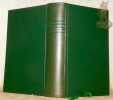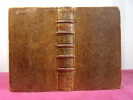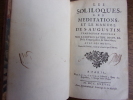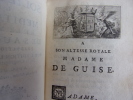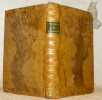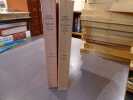-
Type
Autograph (1)
Book (53108)
Magazine (286)
Manuscript (2)
Maps (1)
New book (1)
Old papers (1)
Photographs (1)
-
Latest
Last 24h (30)
Last 3 days (61)
Last month (532)
Last week (97)
-
Language
Dutch (2)
English (29)
Finnish (1)
French (53296)
German (16)
Greek (5)
Italian (17)
Japanese (2)
Latin (20)
Polish (1)
Portuguese (2)
Russian (1)
Spanish (7)
Swedish (2)
-
Century
16th (66)
17th (198)
18th (1287)
19th (3682)
20th (22503)
21st (3814)
-
Countries
Belgium (6744)
Brazil (28)
Canada (6)
China (2)
Côte d'Ivoire (63)
Denmark (1012)
France (40658)
Germany (4)
Greece (3)
Italy (54)
Netherlands (281)
Switzerland (4545)
United States of America (1)
-
Syndicate
ALAC (6)
CLAM (5)
CNE (6)
ILAB (22159)
NVVA (1045)
SLACES (953)
SLAM (19840)
SNCAO (41)
Les confessions. Les grands philosophes, N° 11.
Paris, Flammarion, 2008. 12 x 18, 457 pp., reliure d'édition carton imprimé, sous étui carton blanc illustré, état neuf.
Traduction, notes par Joseph Trabucco.
Les Confessions, précédées de Dialogues philosophiques. Oeuvres, I. Edition publiée sour la direction de Lucien Jerphagnon avec, pour ce volume, la collaboration de Sophie Astic, Jean-Yves Boriaud, Parice Cambronne, Jean-Louis Dumas, Sophie Dupuy-Trudelle et Henri-Pierre Tardif de Lagneau. Collection Bibliothèque de la Pléiade n.° 448.
Paris, Librairie Gallimard 1998, 180x110mm, XXXIV - 1520pages, reliure d'éditeur sous jaquette. Jaquette en rhodoïde. Impression sur papier bible. Avec l’emboitage. Déchirure sur le haut du dos la jaquette, autrement exemplaire comme neuf.
Pour un paiement via PayPal, veuillez nous en faire la demande et nous vous enverrons une facture PayPal
LES CONFESSIONS. Tome II. Traduction nouvelle avec intr & notes de J. Trabucco.
Paris, CLASSIQUES GARNIER, 1960, in-12 broché, 392 pp. Bilingue latin-français. Notes au crayon/stylo, état d'usage.
Nombreux titres disponibles en Philosophie.
LES CONFESSIONS. Tome premier (1) : Livres I - VIII (1 à 8)
1960 Paris, Classiques Garnier, 1960. Édition bilingue avec le texte original en latin et la traduction française en regard. Traduction, introduction et notes de Joseph Trabucco. In-12 broché de XI - 368 pp. Quelques rares petites marques marginales au bic, sinon très bon état.
Les confessions. Traduction nouvelle avec introduction par Edmond Saint-Raymond, illustrées de huit eaux-fortes composées et gravées par Adolphe Lalauze.
Paris, George Hurtrel, Artiste-Editeur sans date, vers 1880, 250x165mm, frontispice, LXV - 370pages, broché. Tirage sur papier vélin non justifié. Bon état.
Couverture rempliée. Pour un paiement via PayPal, veuillez nous en faire la demande et nous vous enverrons une facture PayPal
Les soliloques, le manuel et les méditations de Saint-Augustin
Chez Guillaume Desprez A Paris, Chez Guillaume Desprez, 1751. In-12 relié pleine basane de l'époque, dos à nerfs orné de fleurons dorés, titre doré. Un coin émoussé. 1 feuillet blanc, titre, XVIII + 1 feuillet non chiffré + 553 pages + 2 feuillets blanc. Traduction nouvelle revue très exactement sur le latin. Nouvelle édition à laquelle sont ajoutées quelques fragments de piété tirés des confessions de ce même saint, qui feront voir quel était son esprit.
Toutes les expéditions sont faites en suivi au-dessus de 25 euros. Expédition quotidienne pour les envois simples, suivis, recommandés ou Colissimo.
Les Soliloques, les Méditations, et le Manuel + le Livre 1737
Les soliloques, les méditations, et le manuel de S. Augustin Traduction nouvelle, sur l’édition latine des PP. BB. De la congrégation de Saint Maur ; avec des notes, nouvelle édition, revue & retouchée par l’auteur. A Paris, chez Louis Genneau, libraire MDCCXXXVII Relié à la suite : Le livre de S. Augustin, de l’esprit et de la lettre Traduit en françois sur les pères bénédictins de la congrégation de S. Maur. Par M. du Bois, de l’académie française A Paris, chez P. G. Le Mercier MDCCXXXVII Deux ouvrages reliés en un seul volume relié au format in 12, de 16 cm X 9 cm. Collation : 1er ouvrage : titre + 10 feuillets non chiffrés + 398 pages ; 2e ouvrage : titre + 1 feuillet non chiffré + 163 pages + 5 feuillets non chiffrés. Pleine-reliure en veau, dos à nerfs et caissons ornés de motifs dorés, accrocs, mors fendu, solidement relié, bien frais, bon état intérieur.
Les soliloques, les méditations et le manuel. Traduction nouvelle, revue très-exactement sur le latin. Nouvelle édition, a laquelle sont ajoutés quelques fragments de piété, tirés des Confessions de ce même Saint, qui feront voir quel était son Esprit.
Paris, Méquignon-Junio. 1834, 175x110mm, IX - 432pages, reliure veau blond marbré avec pièce de titre et d’auteur, et filets et ornementations dorés au dos, tranche et garde marbré. Accros aux deux coiffes. Rousseurs, plus prononcées sur les premières et dernières pages.
Pour un paiement via PayPal, veuillez nous en faire la demande et nous vous enverrons une facture PayPal
Les soliloques les méditations et le manule de S. Augustin - traduction nouvelle sur l'édition Latine des Pères Bénédictins de la Congrégation de Saint Maur - avec des notes - cinquième édition
Louis Coignard 1710 in16. 1710. Relié. Les soliloques les méditations et le manule de S. Augustin - traduction nouvelle sur l'édition Latine des Pères Bénédictins de la Congrégation de Saint Maur - avec des notes - cinquième édition
Reliure défraîchie bords frottés coins émoussés tranche très attaqué par une ancienne exposition à l'humidité pages fragilisées marges très abîmé (tâchées rognées) cependant texte épargné qq annotations à l'encre sur les premières pages
MAL, LIBRE ARBITRE & CONVERSION (Extraits des Confessions).
Paris, GRAND CARACTERE, Sagesse, 2005, in-8 broché, 121 pp. TRES BON ETAT
Nombreux titres disponibles en Philosophie.
Oeuvres. Edition publiée sour la direction de Lucien Jerphagnon. 2 Volumes. Tome I: Les Confessions, précédées de Dialogues philosophiques.Tome II: La Cité de Dieu. Collection Bibliothèque de la Pléiade n.° 448 et 468.
Paris, Librairie Gallimard 2022, 180x110mm, XXXIV - XXVIII - 1520 + 1308pages, reliure d'éditeur sous jaquette. Jaquette en rhodoïde. Sous étui cartonné de l’éditeur. Impression sur papier bible. Exemplaire à l'état de neuf.
Pour un paiement via PayPal, veuillez nous en faire la demande et nous vous enverrons une facture PayPal
Oeuvres (édition de 2000), tome II (2) : La Cité de Dieu. Bibliothèque de La Pléiade, N° 468.
Paris, Gallimard/La Pléiade, 2000. 11 x 18, xxviii-1308 pages, reliure d'édition plein cuir + rhodoïd, sous étui carton blanc imprimé, très bon état.
"Reliure d'édition pleine peau dorée à l'or fin; édition publiée sous la direction de Lucien Jerphagnon."
Philosophie, catéchèse, polémique ( Oeuvres III )
1 vol. in-12 reliure éditeur plein cuir vert sous rhodoid, édition publiée sous la direction de Lucien Jerphagnon, Bibliothèque de la Pléiade, NRF Gallimard, 2002, XXXVI-1433 pp.
Très bon état.
SAINT AUGUSTIN SA VIE SON OEUVRE SA PHILOSOPHIE
PUF. 1942. In-12. Broché. Etat du neuf, Plats abîmés, Dos satisfaisant, Intérieur frais. 150 pages.. . . . Classification Dewey : 100-PHILOSOPHIE ET DISCIPLINES CONNEXES
Classification Dewey : 100-PHILOSOPHIE ET DISCIPLINES CONNEXES
"Soliloques et méditations Collection ""Lectures chrétiennes"""
Rieder. non daté. In-12. Broché. Etat d'usage, Couv. légèrement passée, Dos satisfaisant, Quelques rousseurs. 262 pages.. . . . Classification Dewey : 210-Philosophie et théorie
"Collection ""Lectures chrétiennes"". Traduction nouvelle et méditation de Jacques Artaud. Classification Dewey : 210-Philosophie et théorie"
TEMPS & ETERNITE (Extraits des Confessions).
Paris, GRAND CARACTERE, Sagesse, 2005, in-8 broché, 94 pp. TRES BON ETAT
Nombreux titres disponibles en Philosophie.
Autour de Saint-Augustin (1 volume). Saint Augustin (1 volume).
Paris, Fayard (Collection "Grandes Etudes Historiques"), 2 volumes in 12, brochés, 286 et 463 pages
...................... Photos sur demande ..........................


Phone number : 04 77 32 63 69
Le livre XIII des "Confessions".
Revue des Etudes Augustiniennes, 1956, gr. in-8°, 19 pp, broché, bon état (Tiré à part)
Aux origines du De natura et origine animae de saint Augustin.
Revue des Etudes Augustiniennes, 1973, gr. in-8°, 37 pp, broché, bon état (Extrait de la Revue des Etudes Augustiniennes Vol. XIX, 1973)
Rom. 14,23b dans l'oeuvre de saint Augustin. (Omne quod non est ex fide, peccatum est).
Etudes Augustiniennes, 1972, gr. in-8°, 37 pp, broché, bon état (Extrait des Recherches Augustiniennes, vol. 8)
Les confessions de Saint Augustin, traduites en françois sur l'édition latine des PP. BB. de la congrégation de Saint Maur, avec des notes, et de nouveaux sommaires des chapitres, par M. Du Bois de l'Académie françoise. Nouvelle édition
Paris, d'Hansy, 1760. 350 g In-12, plein veau, dos orné à nerfs, [3] ff., xviii-525-[2] pp.. Le traducteur, Philippe Goibaud-Dubois, était rentré à l'Académie française en 1693. Quelques frottements et taches à la reliure. Ex-libris manuscrit sur le titre. . (Catégories : Religion, Philosophie, )
Les Confessions Livre X
Editions Flammarion 2008 224 pages 18 796x1 524x11 176cm. 2008. pocket_book. 224 pages.
Etat correct
SAINT-AUGUSTIN. CONFESSIONS. 2 volumes.
Les Belles Lettres Paris 1961 In-8 ( 210 X 125 mm ) paginé de XXXI-202 et 209-402 pages, brochés sous couvertures imprimées. Bons exemplaires.
confessions de Saint Augustin traduites en francais sur l'edition latine des PP. BB. de la congregation de Saint-Maur avec des notes et de nouveaux sommaires des chapitres par M. Du Bois.
Lyon-Paris, Blache et Boget, 1807 Reliure depoque plein cuir, dos lisse orne, 504pp, 11x17cm., bon etat, dos un peu endommage.
Les deux temps de grâce. - Faut-il anathématiser la doctrine augustinienne de la prédestination ? - La Dialectique de l'illumination.
Revue des Etudes Augustiniennes, 1961-1962, 3 vol. gr. in-8°, 22, 10 et 13 pp, brochés, bon état (Tirés à part)
 Write to the booksellers
Write to the booksellers